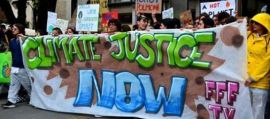Emergenza climatica mondiale “Codice rosso” per l’umanità
Non c'è tempo per ritardare, non c'è spazio per scuse, nessun posto dove scappare, nessun posto dove nascondersi, dobbiamo agire per evitare le catastrofi climatiche
| Richard Brewer |

Foto: la fauna selvatica e le famiglie perdono case senza un posto dove scappare, nessun posto dove nascondersi
OREGON - 9 agosto 2021 - Il Gruppo intergovernativo di esperti sui cambiamenti climatici (IPCC) ha pubblicato lunedì il suo ultimo rapporto, preoccupante e urgente. Le Nazioni Unite lo hanno definito un "codice rosso per l'umanità". Il clima della Terra è già cambiato. È diffuso, rapido e intensificante. Sfortunatamente, è probabile che le cose peggiorino con un futuro più caldo essenzialmente fissato. I nostri figli e nipoti erediteranno il disastro ambientale che stiamo lasciando anche se agiamo ora, e dobbiamo agire ora.
Gli scienziati stanno osservando i cambiamenti del clima terrestre in ogni regione. “Il cambiamento climatico sta già influenzando ogni regione della Terra, in diversi modi. I cambiamenti che sperimentiamo aumenteranno con un ulteriore riscaldamento", ha affermato Panmao Zhai, co-presidente del gruppo di lavoro I dell'IPCC.
Molti cambiamenti nel sistema climatico diventano più grandi in relazione diretta all'aumento del riscaldamento globale. Includono l'aumento della frequenza e dell'intensità delle temperature estreme e delle forti precipitazioni, la siccità agricola ed ecologica in alcune regioni e gli intensi cicloni tropicali, nonché la riduzione del ghiaccio marino artico, del manto nevoso e del permafrost.
Il rapporto prevede che nei prossimi decenni i cambiamenti climatici aumenteranno in tutte le regioni. Con 1,5°C di riscaldamento globale, ci saranno ondate di calore crescenti, stagioni calde più lunghe e stagioni fredde più brevi. A 2°C di riscaldamento globale, le temperature estreme raggiungerebbero più spesso soglie di tolleranza critiche per l'agricoltura e la salute. Il riscaldamento è aumentato negli ultimi anni e ai ritmi attuali è probabile che supereremo la soglia di 1,5 gradi entro dieci o vent'anni, prima delle previsioni del passato.
Il rapporto mostra anche che le azioni umane hanno ancora il potenziale per determinare il futuro corso del clima. L'evidenza è chiara che l'anidride carbonica (CO2) è il principale motore del cambiamento climatico, anche se anche altri gas serra e inquinanti atmosferici influenzano il clima. Solo tagliando profondamente le emissioni di gas serra, rimuovendo al contempo l'anidride carbonica dall'atmosfera, possiamo fermare la precipitosa tendenza.
“La stabilizzazione del clima richiederà riduzioni forti, rapide e sostenute delle emissioni di gas serra e il raggiungimento di emissioni nette di CO2 pari a zero. Limitare altri gas serra e inquinanti atmosferici, in particolare il metano, potrebbe avere benefici sia per la salute che per il clima", ha affermato Zhai.
“Climate Change 2021: The Physical Science Basis” un rapporto di 3.500 pagine è il contributo del Gruppo di lavoro 1 dell'IPCC al 6° Rapporto di valutazione e fornisce la dichiarazione più completa, scientificamente solida e definitiva sulle condizioni climatiche e le prospettive disponibili. È disponibile in inglese su https://www.ipcc.ch/report/ar6/wg1/
Segue due documenti precedenti: la prima dichiarazione del Summit del Premio Nobel "Our Planet, Our Future: An Urgent Call for Action." pubblicata il 3 giugno 2021 e cofirmata da 126 premi Nobel che diceva: "Per la prima volta nella nostra esistenza, le nostre azioni stanno destabilizzando parti critiche del sistema Terra che determinano lo stato del pianeta”. Quella dichiarazione è stata presto seguita da "Avviso degli scienziati del mondo su un'emergenza climatica 2021" pubblicato il 28 luglio 2021 sulla rivista BioScience che riporta nuovi studi condotti da due ricercatori dell'Oregon State University e sostenuti da una coalizione di quasi 14.000 scienziati provenienti da 153 paesi.
Ora è inequivocabile che l'influenza umana ha riscaldato l'atmosfera, l'oceano e la terra. Si sono verificati cambiamenti diffusi e rapidi nell'atmosfera, nell'oceano, nella criosfera e nella biosfera. La portata dei recenti cambiamenti in tutto il sistema climatico nel suo insieme e lo stato attuale di molti aspetti del sistema climatico sono senza precedenti da molti secoli a molte migliaia di anni.
Il cambiamento climatico indotto dall'uomo sta già influenzando molti eventi meteorologici e climatici estremi in ogni regione del mondo, alcuni dei quali irreversibili. Le prove dei cambiamenti osservati in eventi estremi come ondate di calore, forti precipitazioni, siccità e cicloni tropicali e, in particolare, la loro attribuzione all'influenza umana, si sono rafforzate dal quinto rapporto di valutazione del 2013.
La finestra si sta chiudendo per evitare esiti catastrofici. Il mondo si è riscaldato di 1,1 gradi centigradi in più rispetto ai livelli preindustriali e stiamo sbandando verso 1,5 gradi, una soglia critica. È chiaro che poiché la crisi climatica spinge le temperature globali più in alto, tutte le società, dalla Siberia settentrionale all'Europa, dall'Asia all'Australia, dal Nord America al Sud America, devono prepararsi a eventi meteorologici più estremi.
Il rapporto dell'IPCC è anche chiaro che i leader globali devono ridurre le emissioni di gas serra ora, prima che gli estremi meteorologici mortali e costosi peggiorino ulteriormente. Ma un messaggio chiave nel rapporto è che è ancora possibile prevenire gli impatti più terribili…
*****************IN ENGLISH ************
World Climate Emergency “Code Red” for humanity
No time to delay, no room for excuses, nowhere to run, nowhere to hide, we must act to avert climate catastrophes
OREGON - 9 August 2021 - The Intergovernmental Panel 0n Climate Change (IPCC) released their latest report on Monday and it is disturbing and urgent. The United Nations has called it a “code red for humanity.” Earth’s climate has already changed. It is widespread, rapid, and intensifying. Unfortunately, things are likely to get worse with a hotter future essentially locked in. Our children and grandchildren will inherit the environmental disaster we are leaving even if we act now, and we must act now.
Scientists are observing changes in Earth’s climate in every region. “Climate change is already affecting every region on Earth, in multiple ways. The changes we experience will increase with additional warming,” said IPCC Working Group I Co-Chair Panmao Zhai.
Many changes in the climate system become larger in direct relation to increasing global warming. They include increases in the frequency and intensity of hot extremes and heavy precipitation, agricultural and ecological droughts in some regions, and intense tropical cyclones, as well as reductions in Arctic sea ice, snow cover and permafrost.
The report projects that in the coming decades climate changes will increase in all regions. With 1.5°C of global warming, there will be increasing heat waves, longer warm seasons and shorter cold seasons. At 2°C of global warming, heat extremes would more often reach critical tolerance thresholds for agriculture and health. Warming has ramped up in recent years and at current rates we are likely to cross the 1.5 degree threshold within ten to twenty years, earlier than past predictions.
The report also shows that human actions still have the potential to determine the future course of climate. The evidence is clear that carbon dioxide (CO2) is the main driver of climate change, even as other greenhouse gases and air pollutants also affect the climate. Only by making deep cuts to greenhouse gas emissions, while removing carbon dioxide from the atmosphere, can we halt the precipitous trend.
“Stabilizing the climate will require strong, rapid, and sustained reductions in greenhouse gas emissions, and reaching net zero CO2 emissions. Limiting other greenhouse gases and air pollutants, especially methane, could have benefits both for health and the climate,” said Zhai.
“Climate Change 2021: The Physical Science Basis” a 3,500 page report is the IPCC Working Group 1 contribution to the 6th Assessment Report and provides the most comprehensive, scientifically robust and definitive statement on climate conditions and outlook available. It is available in English at https://www.ipcc.ch/report/ar6/wg1/
It follows two earlier papers: the first Nobel Prize Summit statement ‘Our Planet, Our Future: An Urgent Call for Action.’ released 3 June 2021 and cosigned by 126 Nobel laureates that said,“For the first time in our existence, our actions are destabilizing critical parts of the Earth system that determine the state of the planet.” That statement was soon followed by “World Scientists’ warning of a climate emergency 2021” published 28 July 2021 in the journal BioScience reporting new studies led by two researchers at Oregon State University and backed by a coalition of nearly 14,000 scientists from 153 countries.
It is now unequivocal that human influence has warmed the atmosphere, ocean and land. Widespread and rapid changes in the atmosphere, ocean, cryosphere and biosphere have occurred. The scale of recent changes across the climate system as a whole and the present state of many aspects of the climate system are unprecedented over many centuries to many thousands of years.
Human-induced climate change is already affecting many weather and climate extremes in every region across the globe, some of them irreversible. Evidence of observed changes in extremes such as heatwaves, heavy precipitation, droughts, and tropical cyclones, and, in particular, their attribution to human influence, has strengthened since the Fifth Assessment Report of 2013.
The window is closing to avoid catastrophic outcomes. The world has warmed 1.1 degrees celsius higher than pre-industrial levels and we are careening toward 1.5 degrees — a critical threshold. It is clear that as the climate crisis pushes global temperatures higher, all societies – from northern Siberia to Europe, Asia to Australia, North America to South America – must prepare for more extreme weather events.
The IPCC report is also clear that global leaders must cut greenhouse gas emissions now, before deadly and costly weather extremes get even worse. But a key message in the report is that it's still possible to prevent the most dire impacts..























